formerly eScholarship Editions


|
|
|
|
Your request for similar items found 20 book(s). | Modify Search | Displaying 1 - 20 of 20 book(s) | |
| 1. | 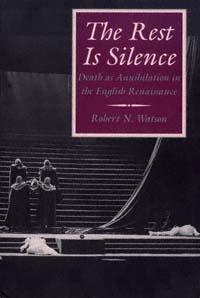 | Title: The rest is silence: death as annihilation in the English Renaissance Author: Watson, Robert N Published: University of California Press, 1995 Subjects: Literature | English Literature | Literary Theory and Criticism | Renaissance Literature Publisher's Description: How did the fear of death coexist with the promise of Christian afterlife in the culture and literature of the English Renaissance? Robert Watson exposes a sharp edge of blasphemous protest against mortality that runs through revenge plays such as The Spanish Tragedy and Hamlet , and through plays of procreation such as Measure for Measure and Macbeth . Tactics of denial appear in the vengefulness that John Donne directs toward female bodies for failing to bestow immortality, and in the promise of renewal that George Herbert sets against the threat of closure.Placing these literary manifestations in the context of specific Jacobean deathbed crises and modern cultural distortions, Watson explores the psychological roots and political consequences of denying that death permanently erases sensation and consciousness. [brief] Similar Items |
| 2. | 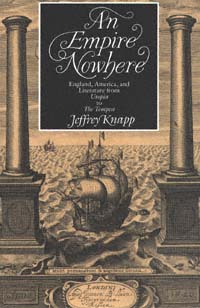 | Title: An empire nowhere: England, America, and literature from Utopia to The tempest Author: Knapp, Jeffrey Published: University of California Press, 1991 Subjects: Literature | Literary Theory and Criticism | United States History | Renaissance Literature | European History Publisher's Description: What caused England's literary renaissance? One answer has been such unprecedented developments as the European discovery of America. Yet England in the sixteenth century was far from an expanding nation. Not only did the Tudors lose England's sole remaining possessions on the Continent and, thanks to the Reformation, grow spiritually divided from the Continent as well, but every one of their attempts to colonize the New World actually failed.Jeffrey Knapp accounts for this strange combination of literary expansion and national isolation by showing how the English made a virtue of their increasing insularity. Ranging across a wide array of literary and extraliterary sources, Knapp argues that English poets rejected the worldly acquisitiveness of an empire like Spain's and took pride in England's material limitations as a sign of its spiritual strength. In the imaginary worlds of such fictions as Utopia , The Faerie Queene , and The Tempest , they sought a grander empire, founded on the "otherworldly" virtues of both England and poetry itself. [brief] Similar Items |
| 3. | 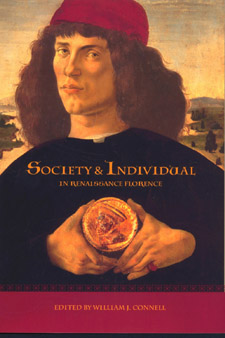 | Title: Society and individual in Renaissance Florence Author: Connell, William J Published: University of California Press, 2002 Subjects: History | Renaissance History | European History Publisher's Description: Renaissance Florence has often been described as the birthplace of modern individualism, as reflected in the individual genius of its great artists, scholars, and statesmen. The historical research of recent decades has instead shown that Florentines during the Renaissance remained enmeshed in relationships of family, neighborhood, guild, patronage, and religion that, from a twenty-first-century perspective, greatly limited the scope of individual thought and action. The sixteen essays in this volume expand the groundbreaking work of Gene Brucker, the historian in recent decades who has been most responsible for the discovery and exploration of these pre-modern qualities of the Florentine Renaissance. Exploring new approaches to the social world of Florentines during this fascinating era, the essays are arranged in three groups. The first deals with the exceptionally resilient and homogenous Florentine merchant elite, the true protagonist of much of Florentine history. The second considers Florentine religion and Florence's turbulent relations with the Church. The last group of essays looks at criminals, expatriates, and other outsiders to Florentine society. [brief] Similar Items |
| 4. | 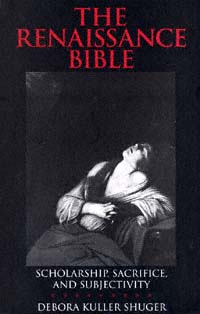 | Title: The Renaissance Bible: scholarship, sacrifice, and subjectivity Author: Shuger, Debora K 1953- Published: University of California Press, 1994 Subjects: Literature | Religion | Literary Theory and Criticism | Renaissance History | Christianity | Renaissance Literature Publisher's Description: This is the first book on the Renaissance Bible by an Anglo-American scholar in nearly fifty years. Not confined to a history of exegesis, it is instead a study of Renaissance culture - a culture whose central text was the Bible. Shuger explores, among other topics, the links between late medieval Christology and early modern subjectivity; religious eroticism and the origins of the sexualized body; the transformation of humanist philology into comparative religion; and the representation of daughter-sacrifice and female erotic desire. [brief] Similar Items |
| 5. | 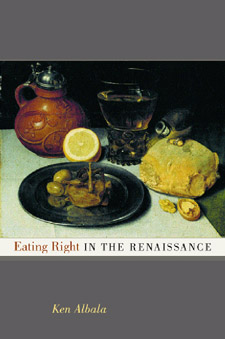 | Title: Eating right in the Renaissance Author: Albala, Ken 1964- Published: University of California Press, 2002 Subjects: Food and Cooking | Renaissance History | History of Science | History of Food Publisher's Description: Eating right has been an obsession for longer than we think. Renaissance Europe had its own flourishing tradition of dietary advice. Then, as now, an industry of experts churned out diet books for an eager and concerned public. Providing a cornucopia of information on food and an intriguing account of the differences between the nutritional logic of the past and our own time, this inviting book examines the wide-ranging dietary literature of the Renaissance. Ken Albala ultimately reveals the working of the Renaissance mind from a unique perspective: we come to understand a people through their ideas on food. Eating Right in the Renaissance takes us through an array of historical sources in a narrative that is witty and spiced with fascinating details. Why did early Renaissance writers recommend the herbs parsley, arugula, anise, and mint to fortify sexual prowess? Why was there such a strong outcry against melons and cucumbers, even though people continued to eat them in large quantities? Why was wine considered a necessary nutrient? As he explores these and other questions, Albala explains the history behind Renaissance dietary theories; the connections among food, exercise, and sex; the changing relationship between medicine and cuisine; and much more. Whereas modern nutritionists may promise a slimmer waistline, more stamina, or freedom from disease, Renaissance food writers had entirely different ideas about the value of eating right. As he uncovers these ideas from the past, Ken Albala puts our own dietary obsessions in an entirely new light in this elegantly written and often surprising new chapter on the history of food. [brief] Similar Items |
| 6. | 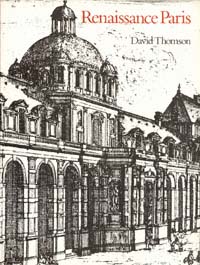 | Title: Renaissance Paris: architecture and growth, 1475-1600 Author: Thomson, David 1912- Published: University of California Press, 1985 Subjects: Art | Architecture Publisher's Description: In the modern literature on Renaissance art and architecture, Paris has often been considered the Cinderella of the European capitals. The prestigious buildings that were erected soon after François I decided in 1528 to make Paris his residence have long since been lost. Thomson, however, restores t . . . [more] Similar Items |
| 7. | 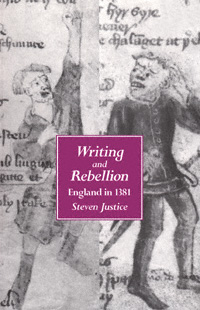 | Title: Writing and rebellion: England in 1381 Author: Justice, Steven 1957- Published: University of California Press, 1994 Subjects: Literature | Literary Theory and Criticism | Medieval Studies | Medieval History | European History Publisher's Description: In this compelling account of the "peasants' revolt" of 1381, in which rebels burned hundreds of official archives and attacked other symbols of authority, Steven Justice demonstrates that the rebellion was not an uncontrolled, inarticulate explosion of peasant resentment but an informed and tactical claim to literacy and rule.Focusing on six brief, enigmatic texts written by the rebels themselves, Justice places the English peasantry within a public discourse from which historians, both medieval and modern, have thus far excluded them. He recreates the imaginative world of medieval villagers - how they worked and governed themselves, how they used official communications in unofficial ways, and how they produced a disciplined insurgent ideology. [brief] Similar Items |
| 8. | 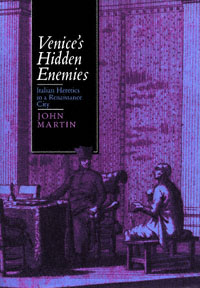 | Title: Venice's hidden enemies: Italian heretics in a Renaissance city Author: Martin, John Jeffries Published: University of California Press, 1993 Subjects: History | European History | Christianity | Renaissance History Publisher's Description: How could early modern Venice, a city renowned for its political freedom and social harmony, also have become a center of religious dissent and inquisitorial repression? To answer this question, John Martin develops an innovative approach that deftly connects social and cultural history. The result is a profoundly important contribution to Renaissance and Reformation studies.Martin offers a vivid re-creation of the social and cultural worlds of the Venetian heretics - those men and women who articulated their hopes for religious and political reform and whose ideologies ranged from evangelical to anabaptist and even millenarian positions. In exploring the connections between religious beliefs and social experience, he weaves a rich tapestry of Renaissance urban life that is sure to intrigue all those involved in anthropological, religious, and historical studies - students and scholars alike. [brief] Similar Items |
| 9. | 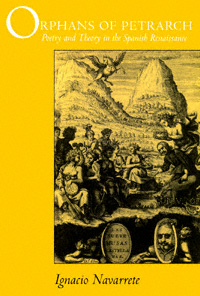 | Title: Orphans of Petrarch: poetry and theory in the Spanish Renaissance Author: Navarrete, Ignacio Enrique 1954- Published: University of California Press, 1994 Subjects: Literature | Literary Theory and Criticism | Poetry | Renaissance Literature Publisher's Description: In Spain as elsewhere, Renaissance poets transformed the lyric tradition by using Petrarch as a source of poetic renewal. But political unity and military hegemony, coupled with a sense of cultural inferiority and an obsession with ethnic purity, made Spain different. Drawing on modern critical theory, Ignacio Navarrete offers a new exposition of the development of Spanish Renaissance poetics. Grounded in both philology and cultural theory, Orphans of Petrarch is the first book to integrate the "Spanish difference" into an understanding of Renaissance lyric as a European phenomenon. [brief] Similar Items |
| 10. | 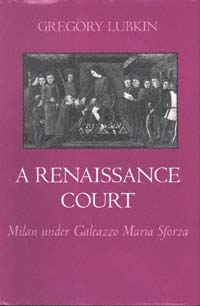 | Title: A Renaissance court: Milan under Galeazzo Maria Sforza Author: Lubkin, Gregory Published: University of California Press, 1994 Subjects: History | Renaissance History Publisher's Description: Ambitious, extravagant, progressive, and sexually notorious, Galeazzo Maria Sforza inherited the ducal throne of Milan in 1466, at the age of twenty-two. Although his reign ended tragically only ten years later, the young prince's court was a dynamic community where arts, policy making, and the panoply of state were integrated with the rhythms and preoccupations of daily life. Gregory Lubkin explores this vital but overlooked center of power, allowing the members of the Milanese court to speak for themselves and showing how dramatically Milan and its ruler exemplified the political, cultural, religious, and economic aspirations of Renaissance Italy. [brief] Similar Items |
| 11. | 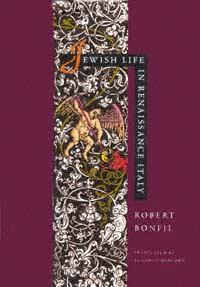 | Title: Jewish life in renaissance Italy Author: Bonfil, Roberto Published: University of California Press, 1994 Subjects: Jewish Studies | Renaissance History | European History Publisher's Description: With this heady exploration of time and space, rumors and silence, colors, tastes, and ideas, Robert Bonfil recreates the richness of Jewish life in Renaissance Italy. He also forces us to rethink conventional interpretations of the period, which feature terms like "assimilation" and "acculturation." Questioning the Italians' presumed capacity for tolerance and civility, he points out that Jews were frequently uprooted and persecuted, and where stable communities did grow up, it was because the hostility of the Christian population had somehow been overcome.After the ghetto was imposed in Venice, Rome, and other Italian cities, Jewish settlement became more concentrated. Bonfil claims that the ghetto experience did more to intensify Jewish self-perception in early modern Europe than the supposed acculturation of the Renaissance. He shows how, paradoxically, ghetto living opened and transformed Jewish culture, hastening secularization and modernization.Bonfil's detailed picture reveals in the Italian Jews a sensitivity and self-awareness that took into account every aspect of the larger society. His inside view of a culture flourishing under stress enables us to understand how identity is perceived through constant interplay - on whatever terms - with the Other. [brief] Similar Items |
| 12. |  | Title: Trials of authorship: anterior forms and poetic reconstruction from Wyatt to Shakespeare Author: Crewe, Jonathan V Published: University of California Press, 1990 Subjects: Literature | Renaissance Literature | English Literature Publisher's Description: For more than a decade, the English Renaissance has been the scene of trial for the critical methodologies of deconstruction, feminism, new historicism, psychoanalytic poststructuralism, and cultural studies. Jonathan Crewe argues that the commitment in the prevailing criticism to innovation, transgression, and radical change has increasingly obscured some powerfully conservative elements both in Renaissance culture and in these critical discourses themselves.In a reading of the poets Wyatt, Surrey, and Gascoigne, and of the biographies of Thomas More and Cardinal Wolsey, Crewe focuses on the relatively stable poetic and cultural forms operative in the Renaissance. He argues that these established forms, which shape poetic composition, social interaction, and individual identity, are subject to only limited reconstruction by English authors in the sixteenth century. They both facilitate and limit literary and social expression and result in more sharply conflicted literary production than contemporary critics have been willing to acknowledge. Crewe concentrates on authors whose canonical status is somewhat precarious and intentionally shifts the emphasis away from the Elizabethan period and toward that of Henry VIII. Trials of Authorship redraws the existing picture of the English Renaissance in the sixteenth century. [brief] Similar Items |
| 13. | 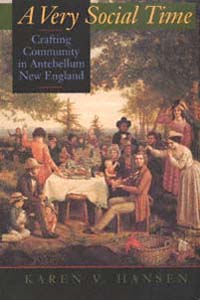 | Title: A very social time: crafting community in antebellum New England Author: Hansen, Karen V Published: University of California Press, 1994 Subjects: History | United States History | Gender Studies | Social Theory Publisher's Description: Karen Hansen's richly anecdotal narrative explores the textured community lives of New England's working women and men - both white and black - n the half century before the Civil War. Her use of diaries, letters, and autobiographies brings their voices to life, making this study an extraordinary combination of historical research and sociological interpretation.Hansen challenges conventional notions that women were largely relegated to a private realm and men to a public one. A third dimension - the social sphere - also existed and was a critical meeting ground for both genders. In the social worlds of love, livelihood, gossip, friendship, and mutual assistance, working people crossed ideological gender boundaries.The book's rare collection of original writings reinforces Hansen's arguments and also provides an intimate glimpse into antebellum New England life. [brief] Similar Items |
| 14. | 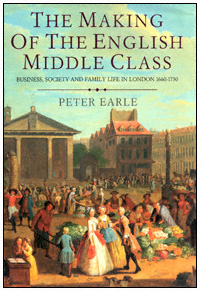 | Title: The making of the English middle class: business, society, and family life in London, 1660-1730 Author: Earle, Peter 1937- Published: University of California Press, 1989 Subjects: History Publisher's Description: This is the first major study of a neglected yet extremely significant subject: the London middle classes in the period between 1660 and 1730, a period in which they created a society and economy that can be seen with hindsight to have ushered in the modern world. Using a wealth of material from contemporary sources - including wills, business papers, inventories, marriage contracts, divorce hearings, and the writings of Daniel Defoe and Samuel Pepys - Peter Earle presents a fully rounded picture of the "middling sort of people," getting to the hearts of their lives as men and women struggling for success in the biggest, richest, and most middle-class city in contemporary Europe.He examines in fascinating and convincing detail the business life of Londoners, from apprenticeship through the problems and potential rewards of different occupational groups, going on to look at middle-class family, social, political and material life - from relationships with spouses, children, servants, and neighbors, to food and clothes and furniture, to sickness, death, and burial.Stimulating, scholarly, and constantly illuminating, this book is an important and impressive contribution to English social history. [brief] Similar Items |
| 15. | 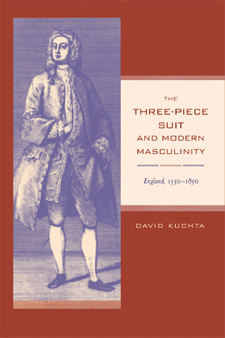 | Title: The three-piece suit and modern masculinity: England, 1550-1850 Author: Kuchta, David 1960- Published: University of California Press, 2002 Subjects: History | European History | Men and Masculinity Publisher's Description: In 1666, King Charles II felt it necessary to reform Englishmen's dress by introducing a fashion that developed into the three-piece suit. We learn what inspired this royal revolution in masculine attire--and the reasons for its remarkable longevity--in David Kuchta's engaging and handsomely illustrated account. Between 1550 and 1850, Kuchta says, English upper- and middle-class men understood their authority to be based in part upon the display of masculine character: how they presented themselves in public and demonstrated their masculinity helped define their political legitimacy, moral authority, and economic utility. Much has been written about the ways political culture, religion, and economic theory helped shape ideals and practices of masculinity. Kuchta allows us to see the process working in reverse, in that masculine manners and habits of consumption in a patriarchal society contributed actively to people's understanding of what held England together. Kuchta shows not only how the ideology of modern English masculinity was a self-consciously political and public creation but also how such explicitly political decisions and values became internalized, personalized, and naturalized into everyday manners and habits. [brief] Similar Items |
| 16. | 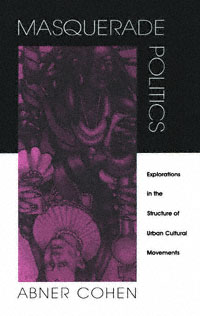 | Title: Masquerade politics: explorations in the structure of urban cultural movements Author: Cohen, Abner Published: University of California Press, 1993 Subjects: Anthropology | Politics Publisher's Description: Carnival, that image of sensuous frivolity, is shown by Abner Cohen to be a masquerade for the dynamic relations between culture and politics. His masterful study details the transformation of a local, polyethnic London fair to a massive, exclusively West Indian carnival, known as "Europe's biggest street festival," which in 1976 occasioned a bloody confrontation between black youth and the police and which has since become a fiercely contested cultural event.Cohen contrasts the development of the London carnival with the development of other carnivalesque movements, including the Renaissance Pleasure Faire of California. His valuable analysis of these relatively little-explored urban cultural movements advances further the theoretical formulations developed in his previous studies. [brief] Similar Items |
| 17. | 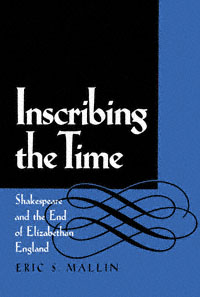 | Title: Inscribing the time: Shakespeare and the end of Elizabethan England Author: Mallin, Eric Scott Published: University of California Press, 1995 Subjects: Literature | English Literature | Literary Theory and Criticism | Renaissance Literature Publisher's Description: Combining the resources of new historicism, feminism, and postmodern textual analysis, Eric Mallin reveals how contemporary pressures left their marks on three Shakespeare plays written at the end of Elizabeth's reign. Close attention to the language of Troilus and Cressida , Hamlet , and Twelfth Night reveals the ways the plays echo the events and anxieties that accompanied the beginning of the seventeenth century. Troilus reflects the rebellion of the Earl of Essex and the failure of the courtly, chivalric style. Hamlet resonates with the danger of the bubonic plague and the difficult succession history of James I. Twelfth Night is imbued with nostalgia for an earlier period of Elizabeth's rule, when her control over religious and erotic affairs seemed more secure. [brief] Similar Items |
| 18. | 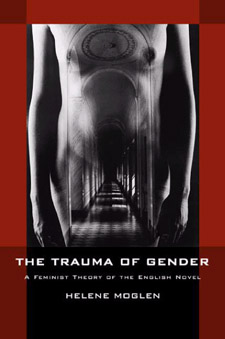 | Title: The trauma of gender: a feminist theory of the English novel Author: Moglen, Helene 1936- Published: University of California Press, 2001 Subjects: Literature | Gender Studies | Women's Studies | European Studies | European History | Literary Theory and Criticism | English Literature Publisher's Description: Helene Moglen offers a revisionary feminist argument about the origins, cultural function, and formal structure of the English novel. While most critics and historians have associated the novel's emergence and development with the burgeoning of capitalism and the rise of the middle classes, Moglen contends that the novel princi- pally came into being in order to manage the social and psychological strains of the modern sex-gender system. Rejecting the familiar claim that realism represents the novel's dominant tradition, she shows that, from its inception in the eighteenth century, the English novel has contained both realistic and fantastic narratives, which compete for primacy within individual texts. [brief] Similar Items |
| 19. | 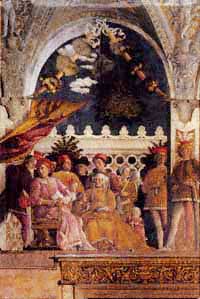 | Title: Knights at court: courtliness, chivalry, & courtesy from Ottonian Germany to the Italian Renaissance Author: Scaglione, Aldo D Published: University of California Press, 1992 Subjects: Literature | European Literature | Medieval Studies | Renaissance Literature Publisher's Description: Knights at Court is a grand tour and survey of manners, manhood, and court life in the Middle Ages, like no other in print. Composed on an epic canvas, this authoritative work traces the development of court culture and its various manifestations from the latter years of the Holy Roman Empire (ca. A.D. 1000) to the Italian Renaissance of the fifteenth and sixteenth centuries.Leading medievalist and Renaissance scholar Aldo Scaglione offers a sweeping sociological view of three geographic areas that reveals a surprising continuity of courtly forms and motifs: German romances; the lyrical and narrative literature of northern and southern France; Italy's chivalric poetry. Scaglione discusses a broad number of texts, from early Norman and Flemish baronial chronicles to the romances of Chrétien de Troyes, the troubadours and Minnesingers. He delves into the Niebelungenlied, Dante, Petrarch, Boccaccio, and an array of treatises on conduct down to Castiglione and his successors.All these works and Scaglione's superior scholarship attest to the enduring power over minds and hearts of a mentality that issued from a small minority of people - the courtiers and knights - in central positions of leadership and power. Knights at Court is for all scholars and students interested in "the civilizing process." [brief] Similar Items |
| 20. |  | Title: Dryden in revolutionary England Author: Bywaters, David A Published: University of California Press, 1991 Subjects: Literature | English Literature | European History Publisher's Description: In 1681, when he wrote Absalom and Achitophel , John Dryden was poet laureate and historiographer royal at the court of his patron Charles II, and the acknowledged champion of a successful political cause. Only a few years later, Dryden's conversion to Roman Catholicism, followed by James II's deposition for favoring Catholics, had cost the poet both his honors and his public. In no way, however, did Dryden accept the status of a political has-been. David Bywaters argues convincingly that this post-revolutionary phase of Dryden's career reveals a polemic as consistent as that of earlier periods.Dryden not only lived on in the country that had metaphorically cast him out but also remained a public literary figure, responding in his work to contemporary political changes. Between 1687 and 1700 he developed a subtle and powerful rhetoric in order to reconstruct his political and literary authority. Discussing both major and less-studied works, Dryden in Revolutionary England tells us much about the relation between politics and literature during a crucial, formative moment. [brief] Similar Items |